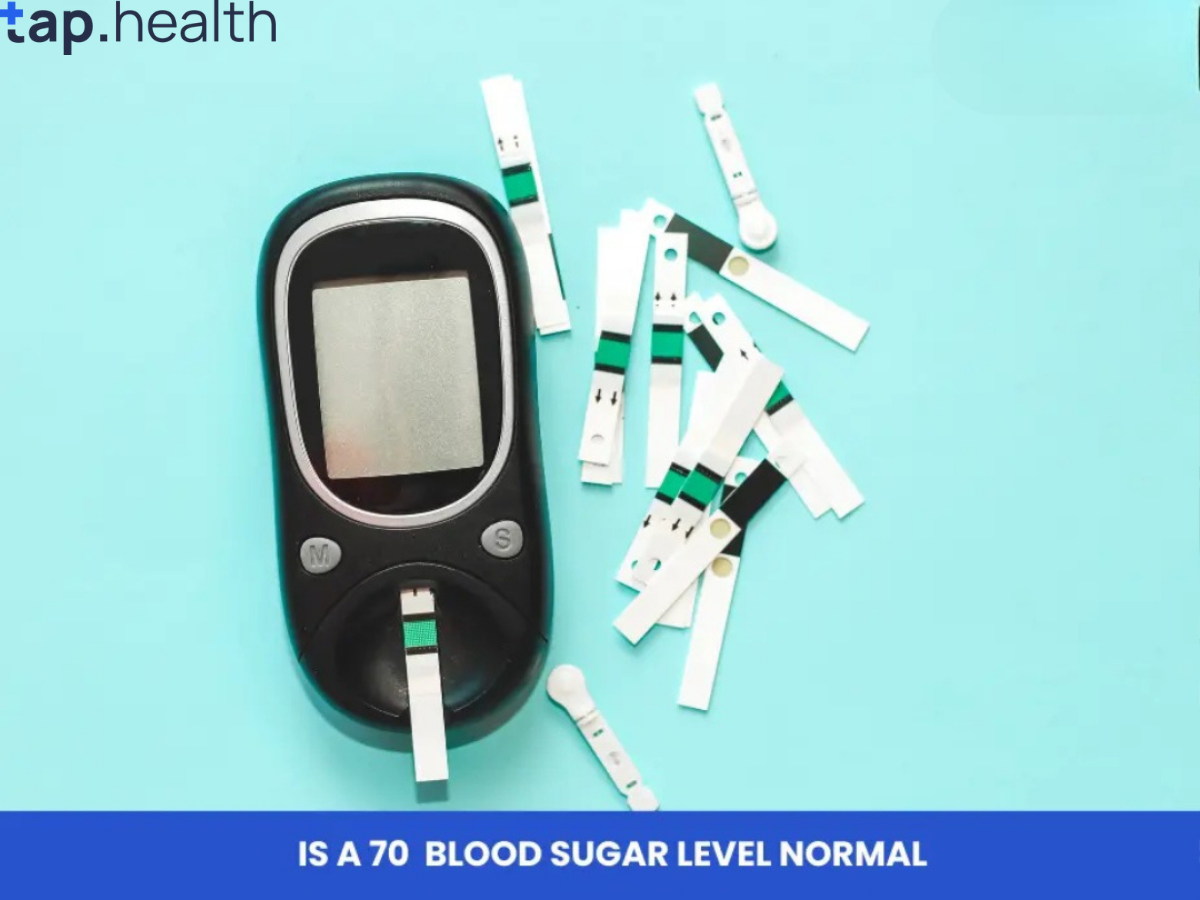Blood sugar, or blood glucose, is a key factor in our health. It gives our body the energy it needs to function properly. But what happens if your blood sugar level reads 70 mg/dL? Is this normal, or does it indicate a problem?
For people with diabetes or those monitoring their health, understanding what different blood sugar levels mean is crucial. In this blog, we’ll explore whether a blood sugar level of 70 mg/dL is normal, the factors that affect it, and how to maintain a healthy balance. We’ll also look at when you should be concerned and what you can do to manage your blood sugar.
What is Blood Sugar?
Before diving into whether 70 mg/dL is normal, it’s important to understand what blood sugar is and how it works.
Blood sugar is the amount of glucose found in your blood. Glucose is a type of sugar that comes from the foods you eat, like carbohydrates. When you digest food, your body breaks down carbohydrates into glucose, which enters the bloodstream. Insulin, a hormone made by the pancreas, helps your cells absorb glucose to use for energy.
Blood sugar levels naturally rise and fall throughout the day, depending on when you eat, how active you are, and how your body responds to insulin. The goal is to keep your blood sugar levels within a normal range to ensure that your body functions properly.
What Are Normal Blood Sugar Levels?
To know whether a 70 mg/dL blood sugar level is normal, let’s first look at the general ranges for blood glucose. Blood sugar levels can vary depending on the time of day and when you last ate. Here are the typical ranges for blood sugar levels:
- Fasting blood sugar (before eating, after 8 hours without food): 70–99 mg/dL
- Normal blood sugar (before meals): 70–130 mg/dL
- Blood sugar 2 hours after eating: Less than 140 mg/dL
- Random blood sugar (at any time of day): Usually between 70–140 mg/dL
As you can see, a blood sugar reading of 70 mg/dL falls within the normal range, especially when measured after fasting or before meals. However, it’s essential to consider other factors, such as symptoms or any underlying health conditions, before determining if it’s “normal” for you.
Is a 70 mg/dL Blood Sugar Level Normal?
A 70 mg/dL blood sugar level is generally considered normal for most people, particularly if it’s measured after fasting or before a meal. This level falls within the typical fasting range (70-99 mg/dL) and is well below the threshold for hypoglycemia (low blood sugar), which is usually defined as below 70 mg/dL.
For someone without diabetes or other conditions affecting blood sugar regulation, a 70 mg/dL reading shouldn’t be a cause for concern. However, if you experience symptoms of low blood sugar, such as dizziness, shakiness, or sweating, it may be a sign that your body is not handling the glucose as well as it should.
What Causes Blood Sugar to Drop?
Blood sugar levels can drop for several reasons. A reading of 70 mg/dL may be influenced by a variety of factors, including:
- Skipping Meals or Eating Too Little
When you skip meals or consume fewer carbohydrates, your body has less glucose to use for energy, which can cause your blood sugar to drop. If you haven’t eaten in a while, it’s natural for blood sugar to decrease. - Increased Physical Activity
Physical activity uses glucose for energy. If you exercise intensely, especially without eating beforehand, your blood sugar can drop as your body uses up its glucose stores. - Medications (Especially for Diabetes)
For people with diabetes, certain medications—especially insulin—can cause blood sugar levels to drop too low. This is why it’s important for people with diabetes to monitor their blood sugar levels regularly and adjust their medication as needed. - Hormonal Changes
Hormones like insulin and cortisol play a significant role in blood sugar regulation. An imbalance in these hormones, whether due to an underlying condition like Addison’s disease or stress, can affect blood sugar levels. - Alcohol Consumption
Drinking alcohol, especially on an empty stomach, can lower blood sugar because it interferes with the liver’s ability to release glucose.
Symptoms of Low Blood Sugar (Hypoglycemia)
Even if 70 mg/dL is technically considered normal, some people may experience symptoms if their blood sugar drops too low. Here are common signs of hypoglycemia:
- Shaking or trembling
- Sweating
- Dizziness
- Hunger
- Confusion or difficulty concentrating
- Irritability or mood swings
- Fatigue or weakness
If you experience any of these symptoms with a 70 mg/dL blood sugar level, it’s essential to take action by consuming a small amount of fast-acting carbohydrates (like a piece of fruit or a glucose tablet). This will quickly raise your blood sugar back to a safe level.
When Should You Be Concerned?
While 70 mg/dL is generally considered normal, there are certain situations where you should be cautious:
- If Symptoms Occur
If you feel symptoms of low blood sugar (shakiness, confusion, dizziness), even at 70 mg/dL, it’s a good idea to take a fast-acting carbohydrate and recheck your blood sugar in 15 minutes. - If You Have Diabetes or Insulin Resistance
People with diabetes or insulin resistance need to be extra cautious with their blood sugar levels. A reading of 70 mg/dL may be normal, but it’s important to consider how you feel and whether this level is consistent for you. Consult your healthcare provider if you’re unsure. - If You’ve Recently Exercised
Intense physical activity can cause your blood sugar to drop. If you’ve been active and your blood sugar is 70 mg/dL, you may need to eat a snack to stabilize it. - If You’re Taking Certain Medications
If you are on medications, particularly insulin, that regulate blood sugar, a level of 70 mg/dL could be a sign that you need to adjust your dosage. Always consult with your healthcare provider for guidance.
How to Maintain Healthy Blood Sugar Levels
Maintaining stable blood sugar levels is crucial for overall health. Here are some tips to keep your blood sugar within a healthy range:
- Eat Regular Meals
Try to eat small, balanced meals throughout the day to keep your blood sugar levels stable. Include whole grains, lean proteins, and healthy fats in your meals. - Exercise Regularly
Physical activity helps regulate blood sugar levels and improves insulin sensitivity. Aim for at least 30 minutes of moderate exercise most days of the week. - Monitor Your Blood Sugar
If you have diabetes or are at risk for blood sugar imbalances, regularly checking your blood sugar will help you understand your body’s patterns and make adjustments as needed. - Avoid Skipping Meals
Skipping meals can cause blood sugar to drop. If you’re unable to eat a full meal, try to have a small snack to avoid dips in glucose levels. - Manage Stress
Stress can affect your blood sugar by triggering the release of cortisol, which can raise blood sugar. Practice stress management techniques like meditation, yoga, or deep breathing.
FAQs on Is a 70 Sugar Level Normal?
Q1: Is 70 mg/dL blood sugar level dangerous?
A: For most people, 70 mg/dL is considered a normal reading, especially if it’s measured after fasting or before a meal. However, if you experience symptoms of low blood sugar, you should take action to raise it.
Q2: What should I do if my blood sugar is 70 mg/dL and I feel symptoms?
A: If you feel symptoms of low blood sugar at 70 mg/dL, eat 15-20 grams of fast-acting carbohydrates, such as fruit juice, glucose tablets, or hard candy, and recheck your blood sugar in 15 minutes.
Q3: Can exercise cause my blood sugar to drop to 70 mg/dL?
A: Yes, intense physical activity uses glucose for energy, and this can cause your blood sugar to drop, especially if you haven’t eaten before exercising.
Q4: How often should I check my blood sugar?
A: If you have diabetes or are concerned about your blood sugar, it’s important to check your blood sugar regularly. Work with your healthcare provider to determine how often you should monitor it.
Conclusion
A blood sugar level of 70 mg/dL is generally considered normal for most people, especially when measured after fasting or before a meal. However, if you feel symptoms or have underlying health conditions, it’s important to monitor your blood sugar regularly and consult your healthcare provider. By maintaining a balanced diet, exercising, and managing stress, you can help keep your blood sugar levels stable and reduce the risk of complications.



